 Dodge Nitro: Seats
Dodge Nitro: Seats
Seats are a primary part of the Occupant Restraint System of the vehicle. They need to be used properly for safe operation of the vehicle.
WARNING:
• Do not allow people to ride in any area of your
vehicle that is not equipped with seats and seat
belts. In a collision, people riding in these areas
are more likely to be seriously injured or killed.
• Be sure everyone in your vehicle is in a seat and
using a seat belt properly.
Front Manual Seat Adjustment
Move the seat forward or rearward using the adjustment bar. Lift up on the bar located on the front of the seat near the floor. Position the seat and release the bar, making sure the latch engages fully.
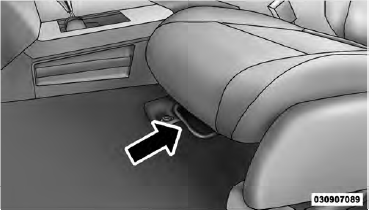 Manual Seat Adjustment
Manual Seat Adjustment
Using body pressure, move forward and rearward on the seat to be sure the seat adjusters have latched.
WARNING: Adjusting a seat while the vehicle is moving is dangerous. The sudden movement of the seat could cause you to lose control. The seat belt might not be properly adjusted and you could be injured. Adjust any seat only while the vehicle is parked.
Front Seat Adjustment — Recline
To adjust the seatback, lift the lever located on the outboard side of the seat, lean back, and release the lever at the desired position. To return the seatback, lift the lever, lean forward and release the lever.
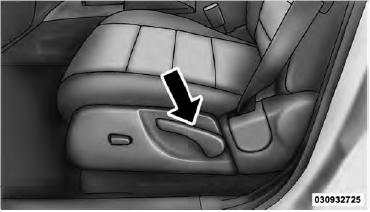 Seatback Release Lever
Seatback Release Lever
WARNING: Do not ride with the seatback reclined so that the seat belt is no longer resting against your chest. In a collision you could slide under the seat belt and be seriously or even fatally injured. Use the recliner only when the vehicle is parked.
Six-Way Driver’s Power Seat with Manual Recliner
The power seat switch is located on the outboard side of the seat near the floor. Use this switch to move the seat up or down, forward or rearward or to tilt the seat.
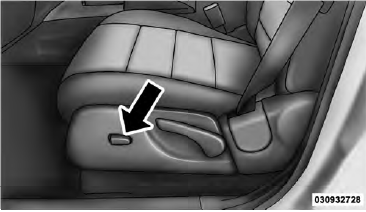 Power Seat Switches
Power Seat Switches
This seat also has a manual recline lever located just to the rear of the power seat switch. Pull up on the lever to recline the seatback.
WARNING: Adjusting a seat while the vehicle is moving is dangerous. The sudden movement of the seat could cause you to lose control. The seat belt might not be properly adjusted and you could be injured. Adjust any seat only while the vehicle is parked.
CAUTION: DO NOT place any article under a power seat or impede its ability to move as it may cause damage to the seat controls. Seat travel may become limited if movement is stopped by an obstruction in the seat’s path.
Fold-Flat Front Passenger Seat
The front passenger seatback can be folded flat to allow for extended cargo space. Pull up on the lever to fold down the seatback.
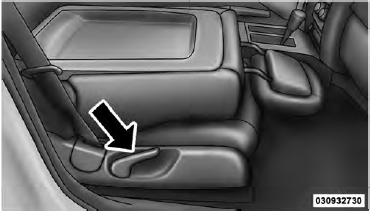 Fold Flat Passenger Seat
Fold Flat Passenger Seat
Adjusting Active Head Restraints
Active Head Restraints can reduce the risk of injury in the event of a rear impact. The Active Head Restraint should be adjusted so the top of the head restraint is located above the top of your ear.
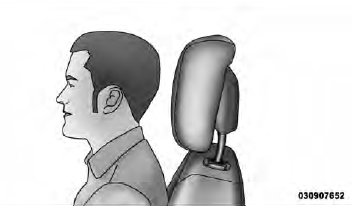 Adjusted Head Restraint
Adjusted Head Restraint
To raise the head restraint, pull upward on the head restraint (on some models, you may need to press the push button). To lower the head restraint, press the push button, located at the base of the head restraint, and push downward on the head restraint.
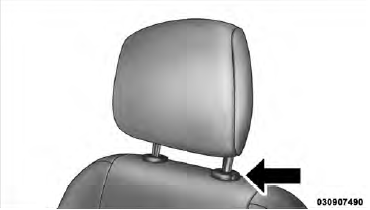 Push Button
Push Button
For comfort the Active Head Restraints can be tilted forward and backward. To tilt the head restraint closer to the back of your head, pull outward on the bottom of the head restraint. Push rearward on the bottom of the head restraint to move the head restraint away from your head.
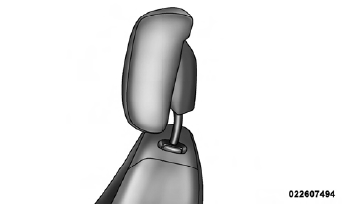 Active Head Restraint (Normal Position)
Active Head Restraint (Normal Position)
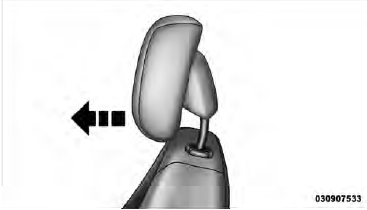 Active Head Restraint (Tilted)
Active Head Restraint (Tilted)
NOTE:
• The head restraints should only be removed by qualified
technicians, for service purposes only. If either of
the head restraints require removal, see your authorized
dealer.
• In the event of deployment of an Active Head Restraint,
refer to “Occupant Restraints/Resetting Active
Head Restraints (AHR)” in “Things to Know Before
Starting Your Vehicle” for further information.
WARNING:
• Driving a vehicle with the head restraints removed
or improperly adjusted could cause serious injury
or death in the event of a collision. The head
restraints should always be checked prior to operating
the vehicle and never adjusted while the
vehicle is in motion. Always adjust the head
restraints when the vehicle is in PARK.
• Do not place items over the top of the Active Head
Restraint, such as coats, seat covers or portable
DVD players. These items may interfere with the
operation of the Active Head Restraint in the event
of an accident and could result in serious injury or
death.
• Active Head Restraints may be deployed if they
are struck by an object such as a hand, foot or loose
cargo. To avoid accidental deployment of the Active
Head Restraint ensure that all cargo is secured,
as loose cargo could contact the Active Head
Restraint during sudden stops. Failure to follow
this warning could cause personal injury if the
Active Head Restraint is deployed.
Heated Seats
This feature heats the front driver and passenger seats. The controls for each seat are located on a switch bank near the bottom center of the instrument panel. After turning the ignition ON, you can choose from High, Low or Off heat settings. Amber indicator lights in each switch indicate the level of heat in use. Two indicator lights will illuminate for High, one for Low and none for Off.
 Press the switch once to select
High-level heating.
Press the switch a second time to select
Low-level heating. Press the switch a third time
to shut the heating elements Off.
When High-level is selected, the heaters provide a
boosted heat level during the first four minutes of
operation after heating is activated. The heat output then
drops to the normal High-level setting. If High-level is
selected, the system will automatically switch to Lowlevel
after approximately 30 minutes of continuous operation.
At that time, the number of illuminated LEDs
changes from two to one, indicating the change. Operation
on Low-level also turns Off automatically after
approximately 30 minutes.
Press the switch once to select
High-level heating.
Press the switch a second time to select
Low-level heating. Press the switch a third time
to shut the heating elements Off.
When High-level is selected, the heaters provide a
boosted heat level during the first four minutes of
operation after heating is activated. The heat output then
drops to the normal High-level setting. If High-level is
selected, the system will automatically switch to Lowlevel
after approximately 30 minutes of continuous operation.
At that time, the number of illuminated LEDs
changes from two to one, indicating the change. Operation
on Low-level also turns Off automatically after
approximately 30 minutes.
NOTE: Once a heat setting is selected, heat will be felt within two to five minutes.
WARNING:
• Persons who are unable to feel pain to the skin
because of advanced age, chronic illness, diabetes,
spinal cord injury, medication, alcohol use, exhaustion
or other physical condition must exercise
care when using the seat heater. It may cause burns
even at low temperatures, especially if used for
long periods of time.
• Do not place anything on the seat that insulates
against heat, such as a blanket or cushion. This
may cause the seat heater to overheat. Sitting in a
seat that has been overheated could cause serious
burns due to the increased surface temperature of
the seat.
CAUTION: Repeated overheating of the seat could damage the heating element and/or degrade the material of the seat.
60/40 Split Folding Rear Seat with Fold-Flat Feature
To provide additional storage area, each rear seat can be folded flat to allow for extended cargo space and still maintain some rear seating room.
The rear seatback also reclines for additional passenger comfort. Pull the release strap while sitting in the rear seat to recline the seatback.
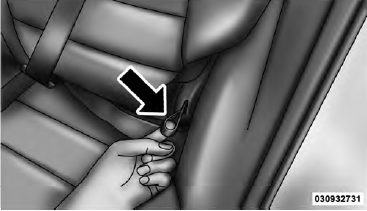 Rear Seat Release Strap
Rear Seat Release Strap
WARNING: Do not ride with the seatback reclined so that the shoulder belt is no longer resting against your chest. In a collision you could slide under the seat belt and be seriously or even fatally injured. Use the recliner only when the vehicle is parked.
NOTE:
• Prior to folding the rear seat, it may be necessary to
reposition the front seat to its mid-track position.
• Be sure that the front seats are fully upright and
positioned forward. This will allow the rear seat to
fold down easily.
WARNING:
• It is extremely dangerous to ride in a cargo area,
inside or outside of a vehicle. In a collision, people
riding in these areas are more likely to be seriously
injured or killed.
• Do not allow people to ride in any area of your
vehicle that is not equipped with seats and seat
belts.
• Be sure everyone in your vehicle is in a seat and
using a seat belt properly.
To Lower Rear Seat
1. Locate the release strap on the lower outboard side of each rear seatback. 2. Pull the release strap (toward the front of the vehicle).
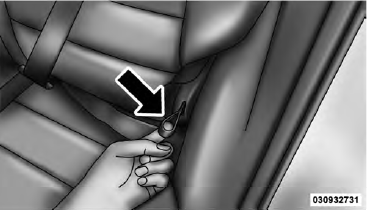 Rear Seat Release Strap
Rear Seat Release Strap
3. Fold the rear seat completely forward. 4. Push down on the seatback to lock it in the folded position.
To Raise Rear Seat
If locked in the folded position, pull the release strap (toward the front of the vehicle). Raise the seatback and lock it into place. If interference from the cargo area prevents the seatback from fully locking, you will have difficulty returning the seat to its proper position.
WARNING: Be certain that the seatback is securely locked into position. If the seatback is not securely locked into position, the seat will not provide the proper stability for child seats and/or passengers. An improperly latched seat could cause serious injury.
 Voice command
Voice command
Voice Command System Operation
This Voice Command system allows you to control your AM, FM radio, satellite radio, disc player, and a memo recorder.
NOTE: Take care to speak into the Voice Interf ...
 To open and close the hood
To open and close the hood
To open the hood, there are two latches that must be
released.
1. Pull the hood release lever located under the left side
of the instrument panel.
Hood Release Lever
2. Push the safety latc ...
See also:
Oil check preparation
Prior to checking the oil level ensure that:
- The vehicle is on level ground.
- The engine oil is cold.
Note: If it is necessary to check the oil level
when the engine is hot, switch off the engi ...
FCC and RSS-210 Industry Canada Compliance
The Car2U system complies with Part 15 of the FCC rules and with
RSS-210 of Industry Canada. Operation is subject to the following two
conditions: (1) This device may not cause harmful interference, ...
Wind Buffeting
Wind buffeting can be described as the perception of
pressure on the ears or a helicopter-type sound in the
ears. Your vehicle may exhibit wind buffeting with the
windows down, or the sunroof (i ...
